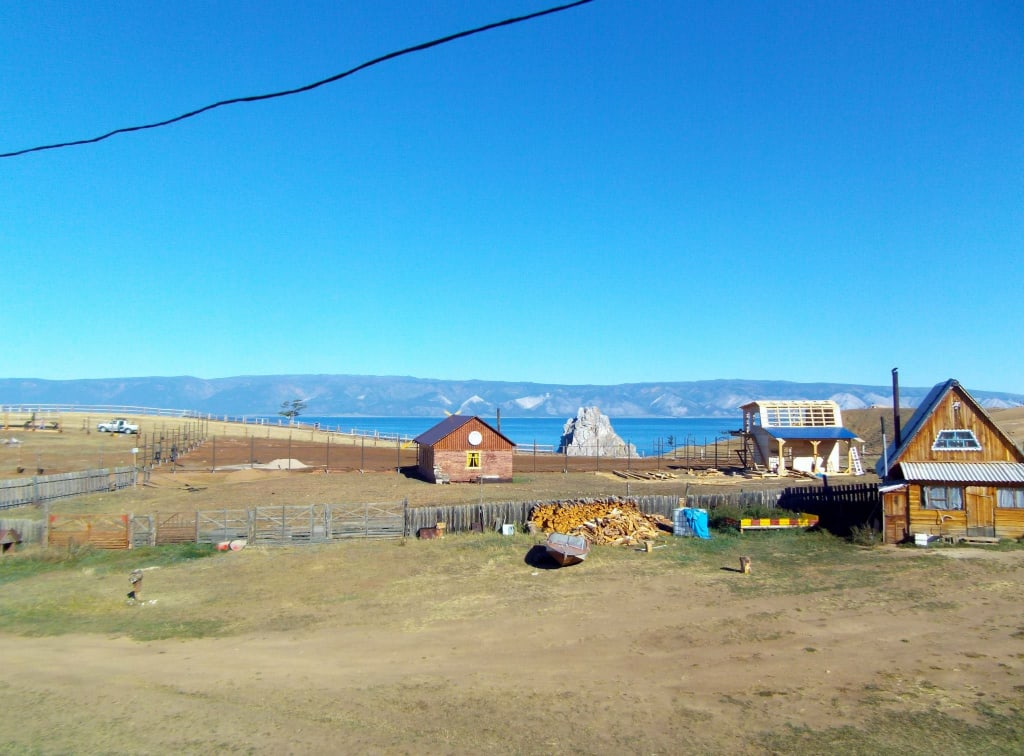10 Myths About Siberia and Why We Should Move There
Siberia is among the most beautiful, diverse and interesting regions anywhere on earth.

When we think of "Siberia," most people form a false impression of the place. Many of us would imagine Siberia as a bitterly cold, desolate wasteland, inhabited only by prisoners exiled by Russian tsars for treason or by the Soviet government for being a bit of a nuisance. But in reality, this huge Russian territory, 13-million square kilometres in size, is among the most beautiful, diverse and interesting regions anywhere on earth. Whether you intend to pay a fleeting visit or settle there and morph into the background, at least you will be able to tell the difference between fact and fiction. Let us discover why this awesome location remains so unknown and shrouded in mystery.
10. It Is Cold All Year Round
Summer exists in Siberia too, you know! Apply your factor-50 sun cream, because the temperature in July and August can sizzle you like a scorpion. 90 degrees Fahrenheit is not uncommon in midsummer, and even Yakutsk, known as the world’s coldest city, broke its record a few years ago with highs of 95 degrees Fahrenheit. Of course, we cannot go on without knowing Yakutsk’s record low winter temperature too. Unbelievably, in what is the world’s coldest inhabited village – a place called ‘Oymyakon’, around a two-day drive from Yakutsk, -96 Fahrenheit was recorded in 1924. Yakutsk, by contrast, managed only a measly -84 Fahrenheit. During a typical year, the temperature tends to differ seasonally by around 120 degrees Fahrenheit.
9. Snow Only Falls In The Winter
Yes, I know I said it was supposed to be hot in the summer. That does not stop the occasional bout of snow from occurring, however. Only last year in the Siberia region of Yakutia, the fluffy white stuff paid an unexpected visit in July, providing a telling reminder of the awaiting winter, which often hits places like Yakutsk in late-September and remains until April. One advantage of tolerating all this is the positive effect on one’s skin. Winter temperatures in Siberia are often mind-bogglingly low, but it is known that the cold air appears to slow down the ageing process. This may be why Siberians win beauty prizes! A 22-year-old Siberian journalist from Krasnoyarsk won ‘the world’s most beautiful face’ during a visit to Mongolia, and was even invited to join a girl-band as a result of her success.
8. The Rivers Are Blue Like Everywhere Else
‘Rivers of blood’ is something we might associate with the bloody French revolution (or so they frequently like to point out in their national anthem). Indeed, many historical battles which took place adjacent to rivers end up causing the water to ‘turn red’ with the blood of the dead. It will be difficult to match the vivid colour of the Dalkdykan River though. One reason for this striking sight is the quantity of natural iron which is found in the region. Another may have been due to a chemical spillage from a nickel manufacturing plant near Norilsk. Either way, this is sight to behold.
7. Everything Is Written In Russian And Nobody Speaks English
Even if you are not familiar with Cyrillic and are not sure of your ‘da’ and ‘nyet’, fear not! Globalisation is here to save you. Let us picture ourselves in one the most remote areas of Siberia, such as the isolated settlement of ‘Khuzhir’. It is situated on Olkhon Island – a mere dot on the gigantic body of water that is Lake Baikal – the world’s oldest and deepest lake which is the size of Belgium. Even here, in a place which could fit the ‘in the middle of nowhere’ tag very nicely, there are still signs such as ‘Internet Café’ written in English, as well as a handful of English speakers. This may be largely due to tourism, but with the English language becoming increasingly important to Russia as a source of business with the United States, United Kingdom and other English-speaking countries.
Despite this, it is certainly worth learning Russian. Not only will Russians appreciate any attempt to conquer their tricky language, it will be a lot easier to socialise with them and learn much more about their country. Sadly, the stereotype of native English speakers is that they are lazy and unwilling to learn other languages. After all, everyone speaks English, don’t they? It is time to buck the trend. Russian’s Cyrillic alphabet is the first element which tends to put off potential learners. Yes, the initial stage is hard, but it takes comparatively little time to learn how to read Cyrillic script. Then, not only is it possible to read signs, it is less likely ever to get lost on one’s travels! Moreover, Russia is not the only country to use Cyrillic script. Apart from a few minor changes, many former Soviet-bloc states use it, so not only will it be difficult to get lost in Russia, it will be hard to lose one’s way in Ukraine or Bulgaria either. Once mastering Cyrillic, the next stage is to learn basic expressions such as ‘I love Russia’, ‘I am a foreigner’ and ‘three bottles of vodka please’. Joking aside, it is important to remember that Russians are, despite stereotypes to the contrary, very warm people who will go to the ends of the Earth to make us feel comfortable in their country.
6. Going To Siberia Is A One-Way Ticket
There is an oft-told joke that everyone in Australia is a descendant of a criminal after Britain sent all its convicts there. Indeed, Siberia too was also once the dumping-ground of political prisoners from tsarist and Soviet Russia. It is thought that 20 million people died there under Josef Stalin’s regime alone. Previously, a certain Vladimir Lenin was exiled to the Siberian city of Krasnoyarsk for revolutionary activities. It is fair to say the authorities were unsuccessful in silencing their victim on that occasion. Moreover, now well-known writers such as Dostoevsky and Solzhenitsyn spent unwanted time in Siberia (and in Solzhenitsyn’s case, a labour camp). But despite severe punishment, both somehow survived to tell the tale. Perhaps most astonishingly of all, Stalin himself escaped Siberia a total of six times!
5. It Is Almost Impossible To Travel Anywhere
Ever heard of the Trans-Siberian Railway? In order to get around this vast region as cheaply as possible, the best way to travel is by rail. Although taking a train from Moscow in the west to Vladivostok in the far east takes an entire week, a ticket can be purchased for around $335, but prices vary depending on distance. Now imagine how much it would cost to take a taxi instead! Alternatively, flights do run all-year round for roughly twice that price. Naturally, Siberians won’t let a little bit of snow impede their journey. When freezing conditions caused a plane to get stuck to the runway at Igarka Airport, passengers helped to push the aircraft along the tarmac. The flight then took off promptly and landed without any further difficulty.
4. Everyone Lives In Shacks Or Log-Cabins
In 1958, Soviet General Secretary, Nikita Khrushchev, commissioned a housing project competition between seven new blocks of flats in Moscow. The idea was to have the blocks built as quickly as possible for the least expenditure. The winner would then represent the blueprint for housing projects to be constructed all over the Soviet Union. Siberia is no exception to this. Many blocks in major Siberian cities, such as Novosibirsk, Irkutsk and Krasnoyarsk were built around that time and to those specifications. Log-cabins do exist, but largely only in the deep forests or in remote places such as Khuzhir (mentioned earlier).
3. There Is Very Little To Eat
It might be difficult to find much fresh fruit in the supermarket, but the fact is that supermarkets do exist in Siberia. At least they do in major cities like Irkutsk, Novosibirsk and Krasnoyarsk. But even in the most remote regions, miles and miles from anywhere, it is still easy to stumble across a ‘produkti’ shop – that is, a place that sells basic goods. Having said that, the unpredictable winter temperatures, compounded by unshakable bureaucracy, frequently cause blight across much of the region, making crop growth irregular. Those living in Siberia’s major cities would have no trouble finding a local pizza house or fast-food outlet, although no McDonalds or KFC officially exists in the capital of eastern Siberia, Irkutsk. There are plenty of Subways, however, and which tend to prove popular among Russians. Best of all would be to make some Russian friends and get them to cook ‘borscht’ for you – a delicious soup based on beetroot. Another popular dish is ‘pelmeni’ – dumplings wrapped in dough. These are quite similar to Polish ‘pierogi’ and are a good way of preserving meat through the winter.
2. It Is Difficult To Find Work
Whilst many Siberians do head west in search of more promising lives in western Russia and beyond, post-Soviet globalisation has enabled new opportunity for business to flourish in Siberia’s major cities. Moreover, as English speakers, we are in demand thanks to many younger Russians requiring fluent English for their increasingly globalised work. English is perceived as the lingua franca of international business, so many Siberia’s are very keen to improve their language skills with an English speaker. Even those who have no need to learn English remain fascinated by a foreigner’s choice to visit their distant land, or, even more shockingly, live among them.
1. Nobody Lives In Siberia
It might not seem like a whole lot, but in fact around 36 million people live in Siberia. That is little more than three people per square kilometre. What we must take into account, however, is that Novosibirsk, the official capital of Siberia as a whole, is home to almost 1.5 million people. Irkutsk, another major city, is also populated by over 600,000 Siberians, meaning that a lot of these 36 million people are concentrated into comparatively small areas. People outside of Russia are often unaware that these cities exist, but in fact they form the backbone of industry in the Motherland. In the Soviet days, Irkutsk was the centre of aircraft manufacturing, and has been a thriving city since the late 1600s, and the first road to Moscow was built soon afterwards. Some people are simply not suited to city living though. In 1936, a Siberian family made the desperate decision to cut themselves off entirely from the rest of civilisation, fearing persecution under Stalin’s terror. From that original family, there is still one survivor – Agafia Lykova, who recently made contact with people for the first time in decades, due to acute leg pain. Dangerous animals such as bears live in the vast Siberian forests, and have even been hungrily attacking locals, so it is perhaps a mark her resilience that she has survived this long.
Now that these myths have been successfully busted and the truth demystified, it may be time to start planning a trip to Siberia!
Links + Sources
[follow these links for further interesting information]
- http://www.telegraph.co.uk/news/weather/10604877/In-pictures-Yakutsk-in-Russia-the-coldest-city-on-Earth.html
- http://siberiantimes.com/ecology/others/features/weather-goes-crazy-in-siberia-with-record-high-temperatures-then-july-snow/
- https://weather.com/travel/news/breathtaking-photos-coldest-city-world-20140128
- https://weatherspark.com/y/142848/Average-Weather-in-Yakutsk-Russia-Year-Round
- https://www.rbth.com/blogs/viral_in_russia/2016/07/13/midsummer-snowfall-hits-siberias-yakutia_611371
- https://spydersden.wordpress.com/2013/03/05/climate-and-its-effects-on-longevity/
- http://news.bbc.co.uk/1/hi/programmes/this_world/7281761.stm
- https://www.theguardian.com/world/2016/sep/07/investigation-ordered-russia-daldykan-river-turns-red-norilsk
- http://lakebaikal.org/
- http://waytorussia.net/Baikal/Destinations/Olkhon.html
- https://www.rbth.com/travel/2014/06/06/the_ultimate_guide_to_siberian_gulags_and_soviet_exile_sites
- http://history-world.org/stalin.htm
- http://realrussia.co.uk/Trains/Trans-Siberian/Average-Ticket-Prices
- https://www.theguardian.com/world/2014/nov/26/russian-airline-passengers-plane-push-freezing-siberian-airport
- https://www.theguardian.com/cities/2015/jun/12/moscows-suburbs-may-look-monolithic-but-the-stories-they-tell-are-not
- https://www.opendemocracy.net/od-russia/georgy-borodyansky/corruption-credits-and-bad-luck-siberian-farmers-under-threat
- https://www.ft.com/content/7cbc024c-2998-11e2-a5ca-00144feabdc0
- https://www.google.co.uk/maps/search/mcdonalds+near+Irkutsk+Oblast,+Russia/@52.2982526,104.1270754,11z/data=!3m1!4b1
- https://www.theguardian.com/lifeandstyle/wordofmouth/2011/apr/07/how-to-cook-perfect-borscht
- http://students.sras.org/abc-language-school-in-irkutsk/
- https://www.thoughtco.com/geography-of-siberia-1435483
- http://www.sras.org/novosibirsk
- http://russiatrek.org/irkutsk-city
- https://www.ruaviation.com/docs/1/2011/8/11/39/?h
- http://www.ambergh.com/learn-russian/irkutsk/about-irkutsk
- https://www.theguardian.com/world/2016/jan/15/siberian-hermit-agafia-lykova-russia-airlifted-to-hospital-over-leg-pain
About the Creator
Marcus Gosling
I'm 23, abstain from sandwiches and was once involved in a catknapping.
I speak Russian, French and my native English, play the violin and have an addiction to chess and 70s fashion and music.
You can find me on Facebook and VKontakte.






Comments
There are no comments for this story
Be the first to respond and start the conversation.